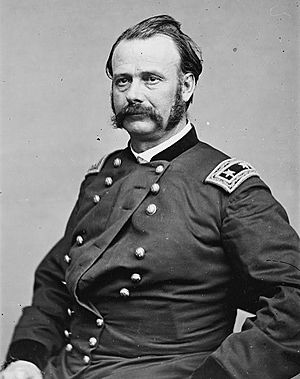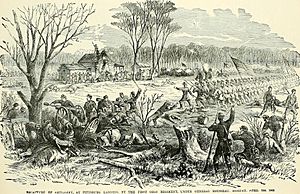Lovell Rousseau facts for kids
Quick facts for kids
Lovell Rousseau
|
|
|---|---|

Portrait of General Rousseau, c. 1862–1869
|
|
| Member of the U.S. House of Representatives from Kentucky's 5th district |
|
| In office March 4, 1865 – July 21, 1866 |
|
| Succeeded by | Asa Grover |
| In office December 3, 1866 – March 3, 1867 |
|
| Preceded by | Robert Mallory |
| Personal details | |
| Born |
Lovell Harrison Rousseau
August 4, 1818 near Stanford, Kentucky |
| Died | January 7, 1869 (aged 50) New Orleans, Louisiana |
| Political party | Whig Unconditional Unionist |
| Spouse | Maria A. Dozie |
| Profession | Lawyer, Politician, military officer |
| Military service | |
| Allegiance | United States of America Union |
| Branch/service | United States Army Union Army |
| Years of service | 1846–1847; 1861–1865; 1867–1869 |
| Rank | |
| Commands | 5th Kentucky Volunteer Regiment Department of Louisiana |
| Battles/wars | Mexican–American War — Battle of Buena Vista American Civil War — Battle of Perryville — Battle of Stones River — Tullahoma Campaign — Third Battle of Murfreesboro |
Lovell Harrison Rousseau (born August 4, 1818 – died January 7, 1869) was an important figure in American history. He was a general in the Union Army during the American Civil War. He also worked as a lawyer and a politician in the states of Kentucky and Indiana.
Early Life and Career
Lovell Harrison Rousseau was born on August 4, 1818, near Stanford, Kentucky. When he was 15, his father passed away, and Lovell became the main supporter for his family. He had to sell his family's enslaved people to pay off their debts.
To earn money, he worked on a road-building crew. He was very determined to improve his life. He studied grammar, math, and French on his own. Later, he returned to Kentucky and studied law in Louisville, Kentucky.
In 1841, he passed the bar exam in Indiana. This meant he could become a lawyer. He started working with his brother, Richard, in Bloomfield, Indiana. Both brothers married daughters of their law firm's leader, James I. Dozier. Lovell married Maria A. Dozier in 1843.
In 1844, Lovell was elected to the Indiana House of Representatives. Two years later, he became a captain in the Mexican–American War. He led a group of volunteers and helped rally troops during the Battle of Buena Vista.
After the war, he served in the Indiana Senate. He also continued his successful law practice. Later, he moved to Louisville, Kentucky, and served in the Kentucky Senate from 1860 to 1861.
Role in the Civil War
As the American Civil War approached, Rousseau strongly believed that Kentucky should stay with the United States. He resigned from the Kentucky Senate in June 1861. He then asked for permission to gather volunteer soldiers.
Despite some opposition, he successfully raised two regiments of Kentuckians. These soldiers trained at Camp Joe Holt in Indiana, just across the Ohio River from Louisville. They were known as the Louisville Legion. With help from other local soldiers, they protected Louisville from being taken by Confederate troops.
In September 1861, he became a colonel of the 5th Kentucky Volunteer Regiment. He was later promoted to brigadier general. He fought bravely in many important battles. These included the Battle of Shiloh and the Battle of Stones River. He also took part in the Tullahoma campaign and movements around Chattanooga, Tennessee.
Rousseau was promoted again to major general. From November 1863 to November 1865, he was in charge of Nashville, Tennessee. In July 1864, he led a very successful raid on the Montgomery and West Point Railroad. This raid was ordered by General Sherman.
Time in Congress
In 1864, Rousseau was elected to the United States House of Representatives. He represented Kentucky as an Unconditional Unionist. He served from 1865 to 1866. Because he was a former military officer, he worked on the Committee on Military Affairs.
In June 1866, Rousseau had a disagreement with Iowa Congressman Josiah Bushnell Grinnell. They debated a bill about the Freedmen's Bureau. This bureau helped formerly enslaved people. Rousseau was against giving the bureau more power. Grinnell, who had helped runaway slaves, strongly supported the bill. Their debates became very heated.
After a session of Congress on June 14, 1866, Rousseau approached Grinnell. He was upset about comments Grinnell had made. Rousseau then struck Grinnell with his cane. Grinnell was not seriously hurt. A committee investigated the incident. Rousseau was officially criticized for his actions and soon resigned. However, he was re-elected later that same year to fill his own empty seat. He continued to serve until 1867.
Later Life and Passing
After leaving the United States House of Representatives, Rousseau was appointed a brigadier general in the United States Army. He also received the honorary rank of major general.
On March 27, 1867, he was sent to Alaska. General Rousseau played a key role in the Alaska Purchase. This was when the United States bought Alaska from the Russian Empire on October 18, 1867. This day is now celebrated as Alaska Day.
On July 28, 1868, he was put in charge of the Department of Louisiana. He passed away in this role in New Orleans, Louisiana, on January 7, 1869. He was first buried in Cave Hill Cemetery in Louisville, Kentucky. In 1892, his wife had his body moved to Arlington National Cemetery in Arlington, Virginia. His monument still stands at Cave Hill.
 | Misty Copeland |
 | Raven Wilkinson |
 | Debra Austin |
 | Aesha Ash |


